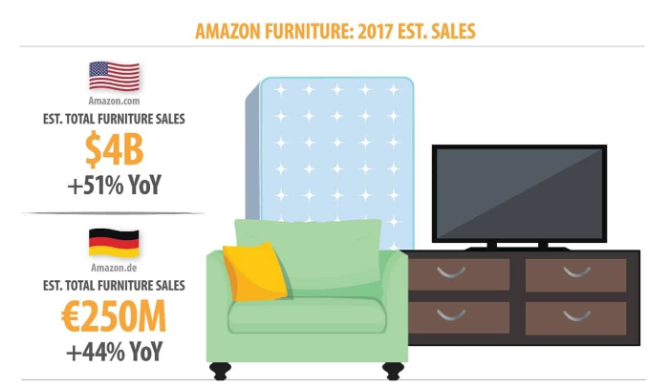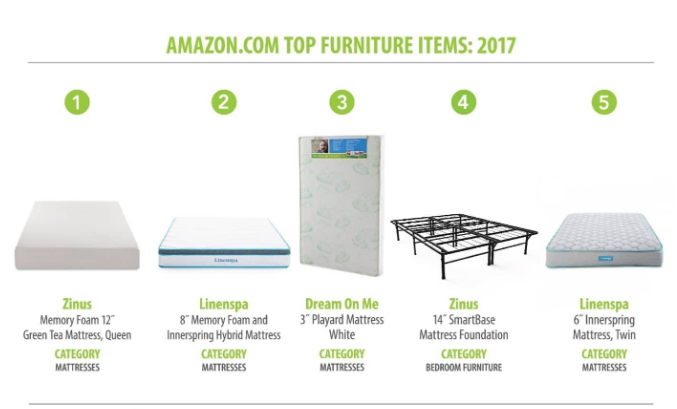Pottery Barn, Crate & Barrel, Ikea and most other leading chains are still performing strong year after year, but are gradually losing market share to online-only competition. Wayfair, the largest specialized online furniture retailer in the U.S., redoubled its efforts in search and TV advertising last year in order to dominate the Google results page – but Wayfair's biggest competitor is not brick-and-mortar chains, it's Amazon.
Having once depended on showroom displays, lagging behind other markets in ecommerce growth, Furniture is now moving swiftly into the online domain. By our estimations, Amazon already holds the largest market share in this space after more than tripling its annual furniture sales since 2015. Last year, Amazon invested in Furniture with a brand new comprehensive marketing site – Amazon Home – the building of four new warehouses focused on delivering large furniture and appliances, and the release of two private furniture brands, Rivet and Stone & Beam. As a result, the YoY growth rate continued to climb, reaching 51%.
Amazon has some crucial advantages over specialized competitors like Wayfair and Overstock.com. Consumers already spend a lot of time on Amazon when they’re not in the market for new furniture and Amazon is the most popular starting point for product searches online. Wayfair, Overstock and brick-and-mortar chains are competing with each other for the greater share of Google's search results, but Amazon doesn't have to because most online shoppers are skipping search engines anyway. So for furniture brands to compete in eCommerce, it's time to invest in an Amazon-first strategy.
Mattresses
In both size and growth, Mattresses is Amazon's largest Furniture category by far. In 2017, Amazon's mattress sales reached $1.1 billion by our estimates, an increase of 82% compared to 2016. Almost 75% of mattresses sold of Amazon are memory foam mattresses, led by the Zinus brand. This speaks to the purchasing trends of Amazon shoppers. The average price of the leading furniture items sold on Amazon is the lowest among the top eight furniture retailers in the US and foam mattresses tend to be more affordable than spring mattresses of similar quality. Brick-and-mortar furniture stores maintain a firm hold on high-end furniture, but more affordable brands can reach the widest base of consumers by selling through Amazon.
Zinus, which offers both memory foam and spring mattresses but has seen most success in the former, tripled its sales in 2017 to become Amazon's largest furniture brand overall. This digital-native brand achieved success by specializing in innovative foam mattresses which are conveniently compressed for shipping, helping the brand succeed online while others were limited by high delivery costs.
The leading mattress brand is also the #1 brand in the 2nd largest category, Bedroom Furniture. Zinus' beds and mattress frames were able to piggyback off of the high sales and brand awareness generated by their very successful foam mattresses. When an Amazon shopper buys a Zinus mattress, the product page directs them to the brand's bed frames via the "frequently bought together" and "customers who bought this item also bought" section, which keeps traffic flowing through their whole product line.
Innovation continues to be a powerful force in furniture. Linenspa has introduced a "Memory Foam and Innerspring Hybrid Mattress" which, at the time of writing, outranks the Zinus' top item. It's too soon to say whether Linenspa can maintain that rank, but it's a good example of how innovative competitors can outrank even the most successful brands on Amazon – if they have the right strategy.
Competitive Fields
The remaining top categories in Amazon's Furniture product group offer a more competitive playing field for brands. Living Room Furniture is the third largest category, growing by 40% in 2017 to a value of over half a million, and there are no single brands that hold more than 6% of the category's sales (together, the 7 leading brands hold less than 50% of the category). This combination of high sales volume, rapid category growth, and lack of a major dominant competitor means that Living Room Furniture is a great target category for furniture brands looking to enter the online market.
At the time of writing, the top brands in YTD sales include Ashley Home Furniture, Coaster Home, and Winsome, but none of these brands rank significantly ahead of the competition. Winsome also has a strong hold in Kitchen Furniture, along with Cosco and Flash Furniture, but as with the Living Room category, there are no dominant brands. Considering the emphasis Amazon has put on Furniture throughout 2017 and 2018, we expect brands in both these categories to offer major promotions on Prime Day in an effort to grab more category share. At this point, both of these areas are wide open to new competition and there is no telling which brands will rank highest by the end of the year.
Private Brands
Last November, Amazon launched their first two furniture brands, Rivet and Stone & Beam. Both specialize in living room furniture, with Rivet selling affordable mid-century modern pieces and Stone & Beam selling higher-end furniture. The two brands, which together feature hundreds of pieces, are currently Prime exclusive but point to Amazon's aspirations as a major player in the furniture space.
While these are Amazon's first two furniture-specific brands, the company's most successful furniture products so far are office chairs from AmazonBasics, the leading brand in the Home Office Furniture category. Sales of AmazonBasics office chairs grew steadily throughout early 2017 but accelerated with the help of strategic promotions on Prime Day. So far in 2018, AmazonBasics controls about 13% of all 1P Home Office Furniture sales and had the top three items in the category with their high, mid, and mesh-backed office chairs.
It's clear that the furniture market is a valuable investment for Amazon, and it's equally true that Amazon is a valuable investment for furniture brands. The retailer's large and loyal base of Prime members are not likely to shop at another online retailer if they don't have to, and Amazon's investments in logistics, private brands and new technologies are growing this base. The company already holds the largest market share of online furniture sales and is likely to capture the bulk of future growth in the long term. Furniture brands looking to compete in eCommerce, the industry's fastest-growing space, need to begin at Amazon.







